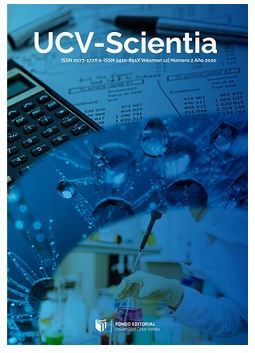Responsabilidad social e investigación científica en una universidad privada de Lima, Perú
DOI:
https://doi.org/10.18050/ucvs.v.13i1.01Palabras clave:
Responsabilidad social, investigación científicaResumen
El artículo presenta los resultados de la investigación referida al cumplimiento de la responsabilidad social (RS) en a investigación científica (IC) en el país. Asume el paradigma Interpretativo, enfoque Cualitativo, diseño Hermenéutico. La muestra estuvo conformada por cinco estudiantes de Doctorado en una universidad privada de Lima, todos con grado de Magíster e involucrados en la IC. La técnica empleada fue la entrevista y el instrumento una guía de entrevista semi estructurada. El estudio reúne criterios de credibilidad, auditabilidad, transferencia y confirmabilidad de los datos, lo que determina la cientificidad del trabajo. Los resultados determinan que la RS, en términos generales, no se cumple cabalmente en el país, debido principalmente a los intereses capitalistas de las empresas e instituciones y a los fines de lucro, que no va más allá de los intereses económicos, por lo que la población se ve desprotegida en cuanto a su bienestar. La IC en el país como generadora de conocimiento y que busca la beneficiencia de la sociedad, no se está desarrollando a la luz de las necesidades de la sociedad actual; se da un desarrollo mínimo, evidenciándose una formación académica clásica, a ello se suma que los docentes investigadores que contribuyen a la formación de los estudiantes de posgrado no tienen el reconocimiento merecido y perciben remuneraciones bajas. La RS y la IC no se vinculan de manera provechosa ni se evidencia su importancia trascendental para la sociedad. Si bien se vislumbra una cierta relación en la ética, se publican muy poco los resultados de la investigación en revistas especializadas y mayormente estas publicaciones son de menor impacto. Respecto al papel de la universidad, se concluye que hay pasividad en el desarrollo de la IC con RS. La RS planificadas en proyectos sostenibles se reduce en una especie de asistencialismo a la población, a las gestiones específicas y no a la gestión general de contribuir al desarrollo humano de la sociedad. Urge promover planes sostenibles pero que sean realmente dirigidos a mejorar las condiciones de los pobladores.
Referencias
Aguilar, M. (2004). La hermenéutica filosófica de Gadamer. Revista Electrónica Sinéctica, 1(24), 61-64. https://www.redalyc.org/pdf/998/99815918009.pdf
Barth, M.; & Rieckmann, M. (2012). Academic staff development as a catalyst for curriculum change towards education for sustainable development: an output perspective. Journal of Cleaner Production, 1(26), 28-36. https://www.researchgate.net/journal/0959-6526_Journal_of_Cleaner_Production
Battaglia, M., Testa, L., Bianchi, L., Iraldo, F. y Frey, M. (2014). Corporate social responsibility and competitiveness within SMEs of the fashion industry: evidence from Italy and France. Sustainability, 6(2), 872-893. doi: https:// doi.org/10.3390/su6020872. file:///C:/Users/Usuario/Downloads/sustainability-06-00872.pdf
Birindelli, G., Ferretti, P., Intoni, M. y Iannuzzi, A. (2015). On the drivers of corporate social responsibility in banks: evidence from an ethical rating model. Journal of Management & Governance, 109(3), 303-340. doi: https://doi.org/10.1007/s10997-013-9262-9. https://ideas.repec.org/a/kap/jmgtgv/v19y2015i2p303-340.html
Blanco, M. (2017). Estilos de aprendizaje y actitudes ante la investigación científica en estudiantes universitarios. Investigación & Desarrollo, 25(2), 82-99. Doi: http://dx.DOI.org/10.14482/indes.25.2.10960.
Cañete, R., Guilhem, D., Brito, K., Carvalho, M., Valdés, R. y Noda, A. (2014). Responsabilidad institucional y social en la investigación científica. Revista Cubana de Medicina, 53(1), 104-113.
Cervantes, L., Bermúdez, L. y Pulido, V. (2019). Situación de la investigación y su desarrollo en el Perú: reflejo del estado actual de la universidad peruana. Pensamiento y Gestión, 1(46), 1-13. http://eds.b.ebscohost.com/eds/pdfviewer/pdfviewer?vid=0&sid=407848b6-0e0f-406e-be75-53563cb7d5cd%40sessionmgr103
Cuenya, L., y Ruetti, E. (2010). Controversias epistemológicas y metodológicas entre el paradigma cualitativo y cuantitativo en psicología. Revista Colombiana de Psicología, 19 (2) 271- 277.
Cypher, J.M. y Dietz, J. (2014). The Process of Economic Development. (4° ed.). New York: Reutledge.
Duque, Y., Cardona, M. & Rendón, J. (2013). Responsabilidad Social Empresarial: Teorías, índices, estándares y certificaciones. Revista Cuadernos de Administración, 29(50), 196-206.
Du, S., Bhattacharya, C. y Sen, S. (2010). Maximizing business returns to corporate social responsibility (CSR): The role of CSR communication. International Journal of Management Reviews, 12(1), 8-19. Doi: https://doi. org/10.1111/j.1468-2370.2009.00276.x
Fernández A, y Rivera C. (2016). Metodología para el perfeccionamiento de la gestión empresarial de cooperativas agropecuarias. Quito: Editorial de la Universidad de las Fuerzas Armadas ESPE.
Flores, M., Rubio, G. Rodrad, M y Curvelo, J. (2017). Responsabilidad Social Universitaria. “Una aproximación desde la percepción de la colectividad académica”. Revista Científica Hermes 1(17), 80-103.
Gasca, E. y Olvera, J. (2011). Construir ciudadanía desde las universidades, responsabilidad social universitaria y desafíos ante el siglo XXI. Convergencia, 18(56), 37-58.
Lii, Y. y Lee, M. (2012). Doing right leads to doing well: when the type of CSR and reputation interact to affect consumer evaluations of the firm. Journal of Business Ethics, 105(1), 69-81. Doi: https://doi.org/10.1007/s10551-0110948-0
Lichtenstein, D., Drumwright, M. y Braig, B. (2004). The effect of corporate social responsibility on customer donations to corporate-supported nonprofits. Journal of Marketing, 68(4), 16-32. Doi: https://doi. org/10.1509/jmkg.68.4.16.42726
Loli, R., Sandoval, M., Ramírez, E., Quiroz, M., Casquero, R. y Rivas, L. (2015). La enseñanza aprendizaje de la investigación. Representación social desde la perspectiva estudiantil. Anales de la Facultad de Medicina, 76(1), 47-56.
Olarte, D. y Ríos, L. (2015). Enfoques y estrategias de responsabilidad social implementadas en Instituciones de Educación Superior. Una revisión sistemática de la literatura científica de los últimos 10 años. Revista de la Educación Superior, 46(3), 19-40. ISSN: 2395-9037.
Patton, M. (2002). Qualitative research and evaluation methods. (3a. ed.). Thousand Oaks: Sage Publications.
Popkewitz, T. (1988). Paradigmas e ideología en la investigación educativa. Madrid: Mondadori.
Ramírez, M. y García, M. (2010). La alianza universidad-empresa-Estado: una estrategia para promover innovación. Revista EAN, 68, 112- 133.
Robbins, S., y Judge T. (2017). Organizational Behavior, (17° ed.). https://www.pearson.com/us/higher-education/program/Robbins-Organizational-Behavior-Plus-2017-My-Lab-Management-with-Pearson-e-Text-Access-Card-Package-17th-Edition/PGM1810527.html
Rojas, M. y Espejo, R. (2020). La inversión en investigación científica como medida del capital intelectual en las instituciones de educación superior. Información Tecnológica, 31(1), 79-90. http://dx.doi.org/10.4067/S0718-07642020000100079
Ruizalba, J., Vallespín, M. y González, J. (2014). El voluntariado corporativo y sus efectos sobre la satisfacción laboral y el compromiso en empresas familiares de Andalucía. Revista de Empresa Familiar, 4(1), 45-58.
Rusinko, C. (2010). Integrating sustainability in higher education: a generic matrix. International Journal of Sustainability in Higher Education, 11(3), 250-259.
Savelyeva, T. y McKenna, J. (2011). Campus sustainability: Emerging curricula models in higher education. International Journal of Sustainability in Higher Education, 12(1), 55-66.
Sancho J., Creus, A. y Padilla, P. (2011). Docencia, investigación y gestión en la Universidad: una profesión tres mundos. Revista Praxis, 16(14), 17-34.
Terán, G., Montenegro, B., Bastidas, J., Realpe, I., Villarreal, F. y Fernández, A. (2017). Análisis crítico de la responsabilidad social en entidades de salud. Revista Cubana de Investigación Biomédica, 36(1), 1-8. Print version ISSN 0864-0300On-line version ISSN 1561-3011. http://scielo.sld.cu/scielo.php?script=sci_arttext&pid=S0864-03002017000100020&lng=en&tlng=en#?
UNESCO (1998). Conferencia mundial sobre educación superior en el siglo XXI Visión y Acción. http://www. unesco.org/education/educprog/wche/declaration_spa.htm
Vallaeys, F. (2006). El ethos oculto de la Universidad, en CD: Responsabilidad social universitaria. http://www.upch.edu.pe/rector/ durs/images/Biblio/HerramientasRSU/DiagnosticoEthosOcultoUniversitario/elethosocultodelauniversidad.pdf
Vallaeys, F. (2020). ¿Por qué la Responsabilidad Social Empresarial no es todavía transformadora? Una aclaración filosófica. Revista Andamios, 17(42), 309-333. DOI: http://dx.doi.org/10.29092/uacm.v17i42.745.File:///C:/Users/Usuario/Documents/ContentServer.pdf
Descargas
Publicado
Número
Sección
Licencia

Esta obra está bajo una licencia internacional Creative Commons Atribución-NoComercial 4.0.
- Compartir — copiar y redistribuir el material en cualquier medio o formato
- Adaptar — remezclar, transformar y crear a partir del material
- El licenciador no puede revocar estas libertades mientras cumpla con los términos de la licencia.
Bajo las condiciones siguientes:
-
Reconocimiento — Debe reconocer adecuadamente la autoría, proporcionar un enlace a la licencia e indicar si se han realizado cambios<. Puede hacerlo de cualquier manera razonable, pero no de una manera que sugiera que tiene el apoyo del licenciador o lo recibe por el uso que hace.
- No hay restricciones adicionales — No puede aplicar términos legales ni medidas tecnológicas que restrinjan legalmente a otras a hacer cualquier uso permitido por la licencia.













